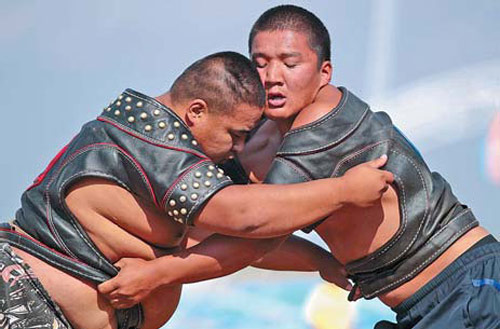A contest to make friends
Updated: 2012-09-27 11:08
By Yang Fang (China Daily)
|
|||||||||||
 |
|
Wrestlers compete at the Nadam Fair in Ordos. Lu Xu / For China Daily |
I always tell people that I am not a typical Mongolian even though I was born and grew up in Hohhot, capital of the Inner Mongolia autonomous region.
Unlike most of my fellow Mongolians who always have a tune on their lips and in their hearts, I'm a terrible singer and dancer. I can't speak the Mongolian language nor ride a horse. Mutton, the basis of the Mongolian diet, is definitely not my favorite.
But my recent trip to Ordos proved to be a journey of self discovery, which helped me reconnect with Mongolian tradition.
About four hours' drive from Hohhot, the city of Ordos, known for its fast development driven by the rich wealth of mineral resources, hosted the Nadam Fair in early September.
Nadam, which means "games" or "entertainment" in the Mongolian language, is a tradition dating back 800 years, when Genghis Khan opened the first Nadam festival.
The carnival has been held as a form of memorial celebration, as an annual sacrificial ritual honoring mountain gods or to celebrate a community endeavor. To Mongolian people, Nadam is ancient, grand and full of fun.
Nowadays, it has become a large-scale gathering including sacrificial rites, celebrations, sports events, entertainment and trade.
In addition to traditional games like wrestling, the fair also features new sports like car racing and canoe racing.
At the festival, men and women, old and young, all dress up in Mongolian gowns, with five-color ribbons on the shoulders and the front of the gown, adorned with red and green silk bands. Most men wear boots and usually have a dagger with a scabbard and snuffbox at the waist.
The three traditional games of wrestling, horse riding and archery are the most exciting events during the weeklong festival.
Mongolians have a high regard for horses, which they have relied on for transport, sustenance and companionship, for centuries.
About 1,000 horses are chosen to compete in the races, which are divided into six categories, based on the age of the horses.
To me, however, the horse racing is more like a foodie feast. After every race, the Mongolian riders gather to drink tea and arak or fermented mares' milk, and enjoy beef pancakes, ice cream, bread and fruit.
I am not a big fan of Mongolian food, but I found myself topping up more fresh meat and delicious salty milk tea.
Next is archery, a sport that originated around the 11th century. Contestants dress in traditional costumes and use bows made of horn, bark and wood as well as arrows made from willow branches and vulture feathers. Their targets are round, leather boards with gray, yellow or red rings.
Apart from Mongolians, there are foreign participants. I get to know a five-member team from the Netherlands, which includes a woman. They are from a European archery club and take part in this year's Nadam "for some fun".
"Fun" is perhaps the priority of most participants, judging from the smiles on their faces.
The wrestling competition runs over two days - it begins at noon on the first day of the festival and ends on the second day.
They are quite unlike other wrestling matches. First, there are no weight divisions - a small wrestler can be pitted against someone two times his weight. Second, there is no time limit - the one who falls first loses the game. The "fall" means any part of a wrestler's body, except his hands or feet, touches the ground.
One of the wrestlers I chat with is Bai Yin from Xilingol. He says he often participates in wrestling games all over the country from May to October. Like most of his peers, he and his wife raise livestock on the grassland.
He ranks quite high up in the game, but all he cares about is to learn new skills and meet new friends. He describes himself as an amateur and says being new in the sport and communicating with other competitors is of great importance to him.
From my observation and after chatting with some of the participants, I realize that the International Nadam Fair is more meaningful than just a sports competition. It also gives Ordos a chance to shine, to show off its charm, and most of all, for friendships to form.
yangfang@chinadaily.com.cn
Related Stories
Grassland scenery in Inner Mongolia 2012-08-24 15:33
Beautiful view of Mongolia's Terelj National Park 2012-08-06 16:59
Fascinating sceneries in Chaihe, N China 2012-07-30 17:00
Gateway to the grasslands 2012-07-26 09:59
Fun in the sun 2012-07-26 09:39
On safari in Inner Mongolia 2012-07-26 09:16
Today's Top News
Rescuers race against time for quake victims
Telecom workers restore links
Coal mine blast kills 18 in Jilin
Intl scholarship puts China on the map
More bird flu patients discharged
Gold loses sheen, but still a safe bet
US 'turns blind eye to human rights'
Telecom workers restore links
Hot Topics
Lunar probe , China growth forecasts, Emission rules get tougher, China seen through 'colored lens', International board,
Editor's Picks

|

|

|

|

|

|





